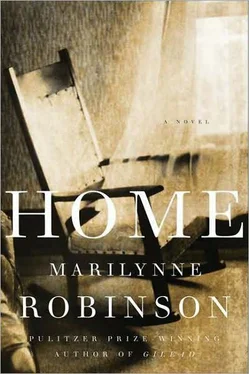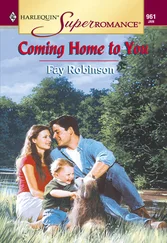The old man said, “Glory has been such a help. He doesn’t talk to me, but he talks to her. Sometimes I hear them laughing, and that’s very good, but I don’t think she can reason with him. I know I can’t.”
Teddy said, “I left my bag in the car. I’ll get it and check you over a bit, listen to your chest, and then we can worry about Jack.” He was the only doctor their father would allow anywhere near him, since the local fellow had suggested that brandy might ease his discomfort a little, and then had given him a tonic which the old man swore was concocted of whiskey and prune juice.
“No, no, Teddy, I don’t care about my heart, that’s very kind. What I want is just to see the two of you together. Is Jack here? I hope you find him, because it seems like I never even get a clear look at him. If you could just stand there beside him, I believe that might help me. I rest all the time, but I can’t get my strength up. So I thought you might help me.”
“Sure, Dad.” Teddy came out to the hallway and called up the stairs, “Jack, would you come here for a minute.” When there was no response, he raised his voice. “Hey, Jack, get down here. Dad wants to see you.” A minute passed and Jack came down the stairs. Teddy said, “He wants to see us together.”
Jack said, “You coming, Glory?” and paused to let her go ahead of him. He had that cautious, distant look, absent the calculation she had learned to recognize as hope. Her father seemed to have forgotten her, and Jack wanted her there, as if she could somehow support him or defend him. But there was a respect in the gesture that Teddy noticed, too, and he set the chair for her by her father’s bed, as if to show that he had not meant to slight her.
“Yes,” their father said, “this is wonderful. Could you stand a little closer, Jack?”
He shrugged. “Sure. If you say so.”
“Yes, now I can see all of you.” He glanced at Jack’s face, then glanced away. “I want a picture of you in my mind, together like that.” After a moment he said, “I have thought so often of when you were boys, and sometimes people would ask if you were twins. There was such a resemblance. That changes over time, of course.”
Jack laughed.
Teddy said, “Somehow I got all the gray hair.”
“Responsibility does that,” the old man said. “You were always the one to take responsibility. Much more than your share.”
“I was always the one to worry,” Teddy said.
“Yes, it comes to the same thing. I’ve worried, myself, the Good Lord knows. That took a great part of my life, I realize, looking back on it.”
Jack rested his hand on the back of Glory’s chair.
“Now I have to put all that aside and stop tormenting myself with the thought that I can do anything about — anything. Yes. But the Lord does work through human beings, through families.” He cleared his throat. “Part of it is giving care and another part is accepting it. That second part is difficult and very important. I know I’ve been a burden to everybody for years and years, and you have all been very good to me. And I’ve enjoyed that, even though I never enjoyed the suffering and the general uselessness that made it necessary. And I hope I have made it clear that I thank God for you, that you have been a great blessing to me. In the time he has been home, Jack has shown great kindness to me. Glory, too, of course. Yes.”
He closed his eyes, and frowned with the carefulness he brought to forming his conclusion.
“That’s what the family is for,” he said. “Calvin says it is the Providence of God that we look after those nearest to us. So it is the will of God that we help our brothers, and it is equally the will of God that we accept their help and receive the blessing of it. As if it came from the Lord Himself. Which it does. So I want you boys to promise me you will help each other.”
Jack laughed.
“And accept help, too. I want you to shake hands and promise me that, too.”
Teddy held out his hand, and Jack took it and released it.
Teddy said, “I promise.”
Jack said, “All right.”
His father looked at him. “What was that, Jack? I thought I heard you say ‘All right.’ I’m sorry, but that seems a bit evasive.”
Jack said, “Yes, sir, I guess it was. I just don’t see how I’m supposed to keep up my side of it. How I could help Teddy.”
“Well, that’s what I mean about receiving help. Teddy took a world of responsibility for you, every way you’d let him do it, and it was because his happiness depended on yours. So the greatest kindness you could ever have shown him was to accept the good he intended for you. You owed him that much. And I mean spiritual help, too. Particularly spiritual help.”
Teddy smiled at Jack and shrugged, sorry for their father’s candor and helpless to bring an end to it. He said, “I just liked Jack. I liked to spend time with him. He doesn’t owe me anything.”
“Oh!” their father said. “I am not in the mood to argue.” His voice broke. “I asked Jack to promise, and he wouldn’t do it. I don’t want to hear you making excuses for him. That has happened far too often, in my opinion.” He was weeping.
Jack said, “No, I was just asking a question. I’ll promise. I mean, I do promise.”
His father did not open his eyes, but he said with great dignity, “I believe I anticipated your question, Jack, and I believe I answered it. Now I’m tired.” And he turned toward the wall.
Teddy went to him and smoothed his hair away from his face, and very gently and casually he laid his fingertips on his brow and his temple and the artery in his neck. He took a handkerchief from the drawer where his father kept them and touched the tears off the old man’s face, lifting his head to dry the wetter, downward side. Then, still holding his head, he turned the pillow to make it dry and cool. He lifted the blanket and sheet to straighten them, and glanced at his father’s slight and crooked body.
“Where’s your stethoscope?” the old man asked.
“It’s in the car.”
“A good place for it. My heart will do whatever it wants to, and it has my permission. Same for my lungs.” Then he said, “You might look in on Ames.”
Teddy stood there, lightly caressing the old man’s hair and face with the handkerchief. “How about some aspirin?”
“No harm in it, I suppose.”
Jack said, “I think I just used it up. I mean, I used it up.”
“I keep it in my bag. So that’s no problem. I’ll leave a bottle here for you.”
Jack put his hands to his face and laughed. “I can’t believe I did that.”
“No matter.” He glanced at Jack, took note of his color, the tremor in his injured hands. “There’s plenty for everybody.”
Glory went to the car, found the pebbly black bag in the passenger seat, and brought it into the kitchen. Opened, it smelled strongly of leather and rubbing alcohol. There were cotton balls and tongue depressors in glass bottles, and thermometers, and assorted pills and salves and syrups and the stethoscope and several bottles of aspirin. When Glory brought the glass of water and two tablets, Teddy looked at them and said, “Three.” He watched her prop her father up to help him swallow. Then he tucked him in again and said, “You’ll feel better when you’ve had some sleep.”
He went into the kitchen, filled a glass of water, and set it on the table with three aspirin tablets next to it. “I use a lot of the stuff myself,” he said, and held up his right hand. The fingers had begun to enlarge at the knuckles and twist out of line.
Jack said, “That’s hard.”
Teddy nodded. “I wish it was only my hands. You’re okay?”
“So far.”
“Glory?”
Читать дальше












